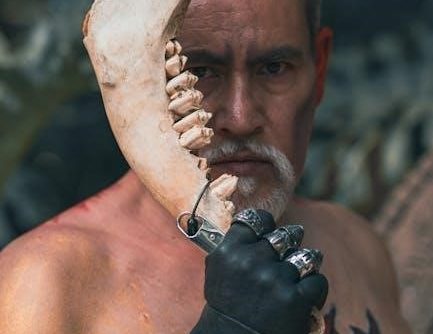
Joseph Campbell, a renowned scholar of comparative mythology, collaborated with Bill Moyers to create The Power of Myth, a timeless exploration of universal myths and their relevance in modern life.
1.1. Who Was Joseph Campbell?
Joseph Campbell (1904-1987) was an American scholar, writer, and professor of literature, renowned for his work in comparative mythology and comparative religion. His seminal book, The Hero with a Thousand Faces, introduced the concept of the Hero’s Journey, a universal pattern in myths worldwide. Campbell’s teachings emphasized the interconnectedness of human experiences through myth, inspiring countless individuals to explore spirituality and personal growth. His legacy endures as a preeminent thinker on the role of mythology in shaping culture and identity.
1.2. The Concept of “The Power of Myth”
The Power of Myth explores how myths transcend cultures and time, offering insights into human experiences. Campbell describes myth as a way to experience life, a clue to spiritual potential, and a reconciliation of life’s contradictions. He emphasizes the universal themes of heroism, love, and transformation, highlighting how myths provide timeless wisdom. The book underscores the importance of mythology in guiding individuals toward spiritual growth and self-discovery, bridging ancient stories with modern life’s challenges and aspirations.
1.3. The Collaboration with Bill Moyers
Joseph Campbell’s collaboration with journalist Bill Moyers resulted in the acclaimed book and PBS series The Power of Myth. Moyers’ engaging interviews with Campbell formed the basis of the project, capturing the scholar’s insights on mythology’s relevance in modern life. Their conversations explored themes like the hero’s journey, rituals, and the spiritual void in secular societies. The collaboration not only popularized Campbell’s ideas but also rekindled interest in mythology, making it accessible to a broad audience and cementing its enduring legacy.
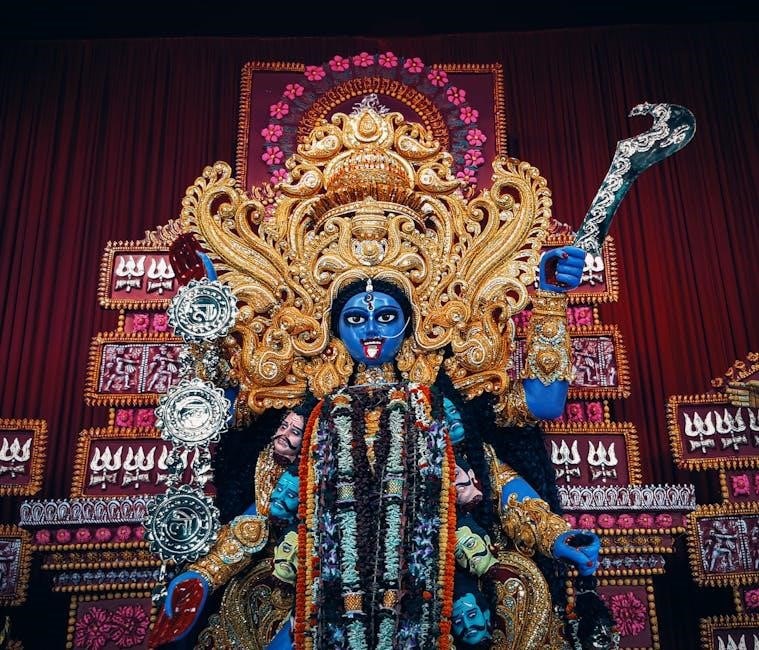
The Hero’s Journey: A Universal Mythological Theme
Joseph Campbell’s concept of the Hero’s Journey describes a universal narrative pattern found in myths worldwide, symbolizing personal growth, transformation, and the quest for meaning.
2.1. The Stages of the Hero’s Journey
The Hero’s Journey, as outlined by Joseph Campbell, consists of stages such as the Ordinary World, the Call to Adventure, Refusal of the Call, and Meeting a Mentor. The hero then crosses into the Special World, faces trials, and undergoes transformation. Ultimately, they achieve triumph, gain insight, and return to their world, bringing newfound wisdom. This structure reflects universal human experiences and psychological growth.
2.2. Examples from World Mythologies
Campbell illustrates the Hero’s Journey with examples from diverse mythologies, such as Odysseus’s return in Greek mythology, Buddha’s enlightenment, and Moses’s leadership in Hebrew tradition. These stories, though culturally distinct, share common themes: the hero’s departure, trials, and transformative return. Such parallels highlight the universal human experiences embedded in myths, reinforcing the idea that the Hero’s Journey is a shared archetype across cultures.
2.3. The Relevance of the Hero’s Journey in Modern Life
The Hero’s Journey remains a powerful framework for understanding modern life’s challenges and opportunities. It mirrors personal growth, self-discovery, and the pursuit of meaning in a rapidly changing world. By following the hero’s path, individuals can navigate transitions, overcome adversity, and find their purpose. Campbell emphasized that myths guide us in confronting life’s complexities, offering timeless wisdom for fulfilling our potential and living authentically.

The Role of Myth in Modern Society
Myths provide timeless guidance, helping individuals find meaning and connection in a chaotic world. They bridge the past and present, fostering personal growth and understanding of human experience.
3.1. The Decline of Traditional Myths
Traditional myths have declined in modern societies, often replaced by scientific and rational perspectives. Campbell laments this loss, arguing it creates a spiritual void. Myths once provided moral guidance and existential meaning, but secularism and individualism have eroded their influence. Without shared mythological narratives, people struggle to find purpose and connection, leading to a sense of disorientation in a rapidly changing world.
3.2. The Spiritual Void in Secular Societies
In secular societies, the decline of traditional myths has left a spiritual void. Campbell argues that without shared mythological narratives, individuals struggle to find meaning and purpose. Science and technology, while powerful, cannot fulfill the deep human need for spiritual connection. This void often leads to feelings of alienation and disorientation, as modern life lacks the grounding once provided by myth. Campbell emphasizes that myths once offered a sense of belonging to something greater, which is now absent in many modern lives.
3.3. Myth as a Tool for Personal Growth
Myths serve as powerful tools for personal growth by offering timeless wisdom and guiding individuals through life’s challenges. Campbell emphasizes that myths provide a framework for self-discovery, helping individuals navigate transformative experiences. The hero’s journey, a universal mythological theme, acts as a metaphor for personal transformation. By engaging with myths, people can gain insights into their own struggles and aspirations, fostering a deeper understanding of their purpose and potential. Myths empower individuals to embrace their uniqueness and find meaning in their lives.
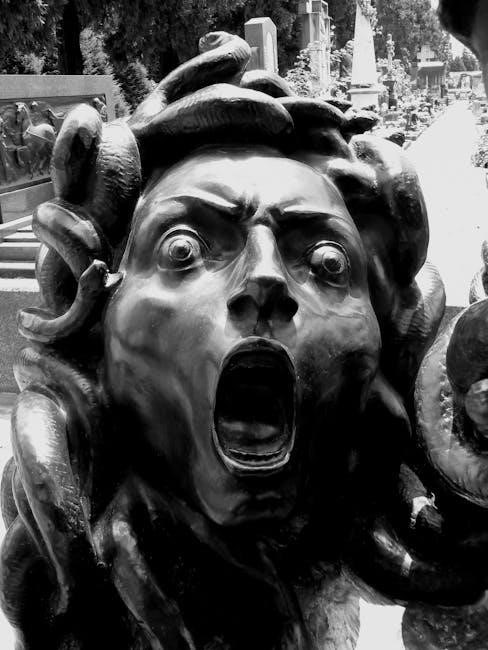
Rituals and Their Connection to Myth
Rituals enact myths, bridging the spiritual and physical worlds. They provide a structured way to experience mythological truths, fostering personal transformation and deeper life meaning.
4.1. The Definition and Purpose of Rituals
Rituals are symbolic enactments of myths, designed to connect individuals with the spiritual and transcendental. They provide a structured way to experience mythological truths, fostering personal transformation. Rituals serve to pitch individuals out of their mundane lives, offering a safe space to confront the unknown and emerge transformed. By participating in rituals, one can transcend the confines of the physical world, aligning with universal principles and gaining spiritual insight. Rituals thus act as a bridge between the human and the divine, facilitating deeper understanding and growth.
4.2. Rituals as Enactments of Myth
Rituals bring myths to life by reenacting their symbolic narratives. These enactments allow participants to experience the mythological themes directly, creating a connection to the deeper truths they represent. Through rituals, individuals embody the hero’s journey, confronting challenges and undergoing transformation; This lived experience of myth fosters a sense of unity with the collective unconscious, making the abstract concepts of mythology tangible and personally relevant. Rituals thus serve as a vital link between the timeless stories of myth and contemporary human experience;
4.3. The Transformative Power of Rituals
Rituals possess the power to transform individuals by immersing them in mythological experiences. They dissolve the boundaries between the mundane and the sacred, fostering spiritual awakening. Through symbolic acts, rituals guide participants to shed outdated perspectives and embrace new insights, aligning them with universal truths. This transformation enables individuals to reconnect with their deeper selves and the world, embodying the wisdom of myths in their lives, as Joseph Campbell often emphasized in his discussions on living spiritually and discovering one’s bliss.
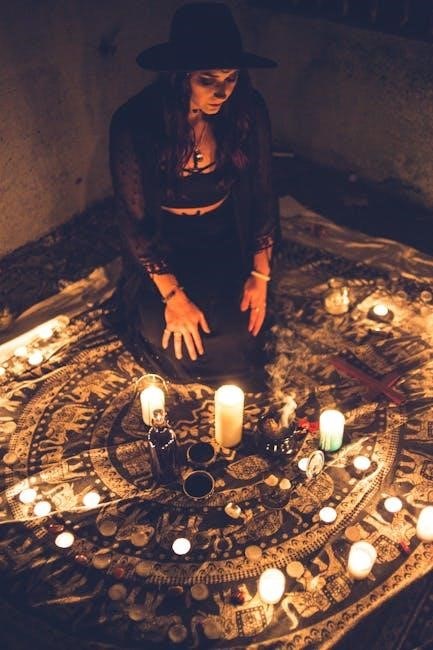
The Function of Myth in Human Life
Myths guide spiritual living, illuminate the human psyche, and offer timeless wisdom, helping individuals navigate life’s challenges and connect with universal truths and deeper meanings.
5.1. Myth as a Guide to Living Spiritually
Myths serve as spiritual guides, offering insights into the universal truths of existence. They reconcile life’s contradictions, providing a framework for understanding and embracing the divine within. Through rituals rooted in myth, individuals can transcend the mundane, connecting with deeper spiritual realities. Campbell emphasizes that myths help us live in harmony with life’s mysteries, fostering a sense of purpose and meaning. By engaging with myths, people can align their lives with timeless spiritual principles, enriching their inner worlds and fostering personal transformation.
5.2. Myth and the Human Psyche
Myths resonate deeply with the human psyche, reflecting universal archetypes and experiences. They provide a symbolic language to explore the subconscious, revealing shared patterns of human thought and emotion. Campbell highlights how myths help individuals confront inner conflicts and integrate opposing forces within themselves. By engaging with mythological narratives, people gain insight into their own psychological journeys, fostering self-awareness and emotional healing. Myths thus serve as mirrors to the soul, offering a pathway to understanding and harmonizing the inner self.
5.3. Myth as a Source of Timeless Wisdom
Myths serve as a wellspring of timeless wisdom, offering insights into universal truths and the human condition; They transcend time and culture, addressing fundamental questions about existence, purpose, and meaning. Campbell emphasizes that myths provide guidance for navigating life’s challenges, revealing patterns and truths that remain relevant today. By engaging with mythological narratives, individuals can access ancient yet enduring wisdom, fostering personal growth and a deeper understanding of the world and their place within it.
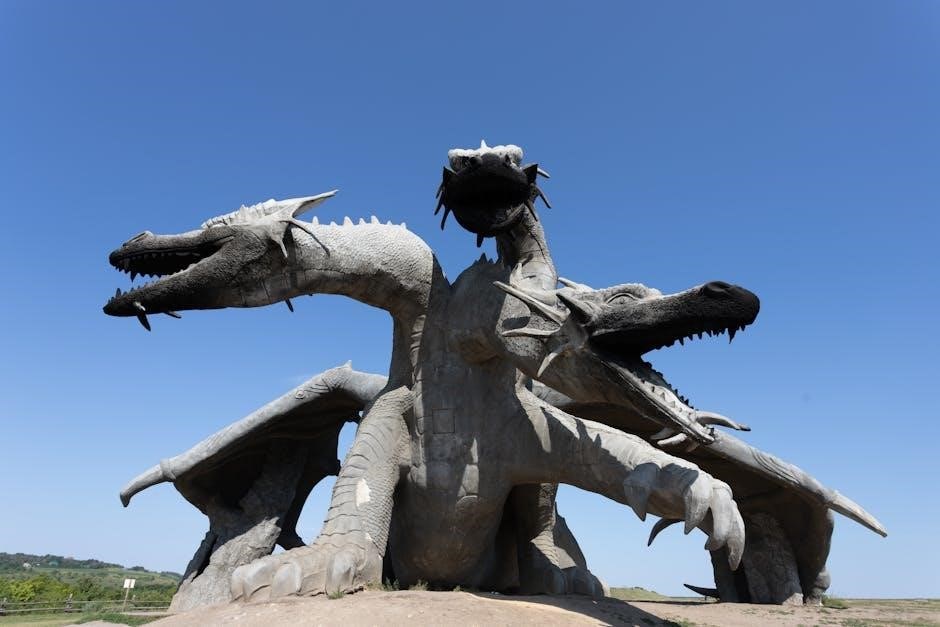
The Legacy of “The Power of Myth”
The Power of Myth has left an enduring impact, influencing popular culture, inspiring new generations, and reigniting interest in Joseph Campbell’s timeless ideas about mythology and human experience.
6.1. The Book’s Impact on Popular Culture
The Power of Myth became a cultural phenomenon, inspiring a PBS series and sparking widespread interest in mythology. Its influence is evident in filmmaking, literature, and psychology, with the “Hero’s Journey” concept shaping Hollywood narratives. The book’s accessible exploration of universal themes has made mythology relevant to a broad audience, bridging academia and popular culture while fostering a deeper understanding of human experiences and storytelling.
6.2. The Renewed Interest in Joseph Campbell’s Work
The publication of The Power of Myth ignited a renewed fascination with Joseph Campbell’s scholarship. The book’s success introduced his concepts, like the “Hero’s Journey,” to a broader audience, inspiring new explorations of mythology and comparative religion. This resurgence of interest led to a reexamination of his earlier works, such as The Hero with a Thousand Faces, cementing his legacy as a pioneering thinker in the field of mythological studies.

6.3. The Enduring Relevance of Campbell’s Ideas
Joseph Campbell’s ideas remain profoundly relevant, offering insights into human experiences and universal truths. His exploration of mythological themes continues to influence fields like psychology, literature, and film. The “Hero’s Journey” resonates across cultures, guiding individuals in their personal quests. Campbell’s work bridges ancient wisdom with modern life, helping people find meaning and purpose in an evolving world. His legacy endures as a testament to the timeless power of myth in shaping human understanding and inspiration.